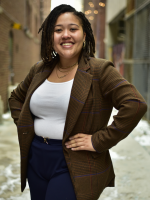For the last three years, journalist Nico Lang traveled the country interviewing families with trans and nonbinary teenagers. They spent day in and day out with these families for two weeks to better understand how they find joy and belonging while coping with nationwide anti-trans rhetoric and legislation.
Lang’s book "American Teenager: How Trans Kids Are Surviving Hate and Finding Joy in a Turbulent Era” tells that story. They recently won a Stonewall Book Award for their work representing the LGBTQ+ experience.
When Lang stopped in Louisville last month for their book tour, they sat down with LPM’s Giselle Rhoden to discuss what they learned throughout their writing journey.
This interview has been edited for clarity and length.
How did American Teenager come together?

Nico Lang: I thought I was going to quit journalism and go to law school. Because I was like, “Well, I could either go to law school — but I don't think I actually really want to do this — or I could write this book that I've always wanted to write, which would tell the stories of trans kids and their families all across the country.” So my vision in my head is that it would be kind of like a fly on the wall documentary, where I would shadow all these families for two-and-a-half weeks.
I just feel like the trans representation has been really limited, and it's often really shallow and told by, cis, straight people in this very navel-gazing way. And I just wanted something that felt really intimate and felt really humanizing. I wanted something that felt like the stories of the trans kids that I actually know and their families like I wanted them to feel represented.
So I wrote the book…because I just felt like I've known so many of these families for such a long time, and I've been working with families of trans kids through my reporting for about 10 years. I had to give these families a chance to speak back to the anti-trans rhetoric that's being spewed about them, because there's so much that's being said about trans kids, but very little of anyone ever talking to trans kids.
How did you find these families for the book?
I needed families that really, really wanted to do this, because you were really putting yourself out there by being involved in this book. It's a really big sacrifice.
There's a lot of vulnerability that goes into this. I know so many families of trans youth who have been forced to flee the country because they're so scared of what could happen to them right now, because they speak out, and they speak out against anti-trans laws and they suffer blowback. People protest outside their house, throw rocks in their window, dox them online. That could have happened to these families. It could have happened to these kids. So I think every family in the book had to really think for themselves: Was that something that they were willing to risk? Did it feel so important to tell their story and speak back to all this anti-trans rhetoric to take that risk?
We whittled it down to seven families. We've got Sioux Falls, South Dakota; Birmingham, Alabama; Houston, Texas; Charleston, West Virginia; the outskirts of Chicago, Illinois. Then after that, Pensacola, Florida. And then finally, we ended back in Torrance, California, which is like an LA suburb.
Of the places you visited for the book, many of those states’ legislators have passed anti-trans legislation. What was that experience like meeting these families that are facing the impact of those kinds of legislation?
What I was so inspired by is seeing how well a lot of these families were doing in spite of it, and I think that's because of the kind of coping mechanisms that they've had to develop in order to survive year upon year of anti-trans legislation. Take a look at South Dakota. This has been happening every year since, like 2016, 2017.
Wyatt in South Dakota, my trans kiddo there in the book, that was something that he really talked a lot about, drawing those boundaries for himself, of like erasing all of the news apps from his phone, and turning off his news alerts, and just not checking the news when he doesn't have to, and not really going on social media that much, and making sure to just cultivate a lot of joy in his free time, listening to music and watching TV and movies and hanging out with friends.
It takes a lot of work to be resilient, and it takes a lot of work to survive. But these families are doing it, and a lot of that also has to do with safe spaces. They have churches where their kids can go to progressive churches where they can be safe and affirmed. They have schools that have been an incredible lifeline for them. They have family members, they have friends, they have these communities built in and I think it's a really big credit to the reason that so many of them are thriving.
I'm quite pleased with the way everything turned out. I love what I do, and I love getting to tell these stories of marginalized people who I know need resources in the same way that I did. I know what it's like to need somebody to tell your story, to need a voice for you. And I'm very grateful that I get to do that.






